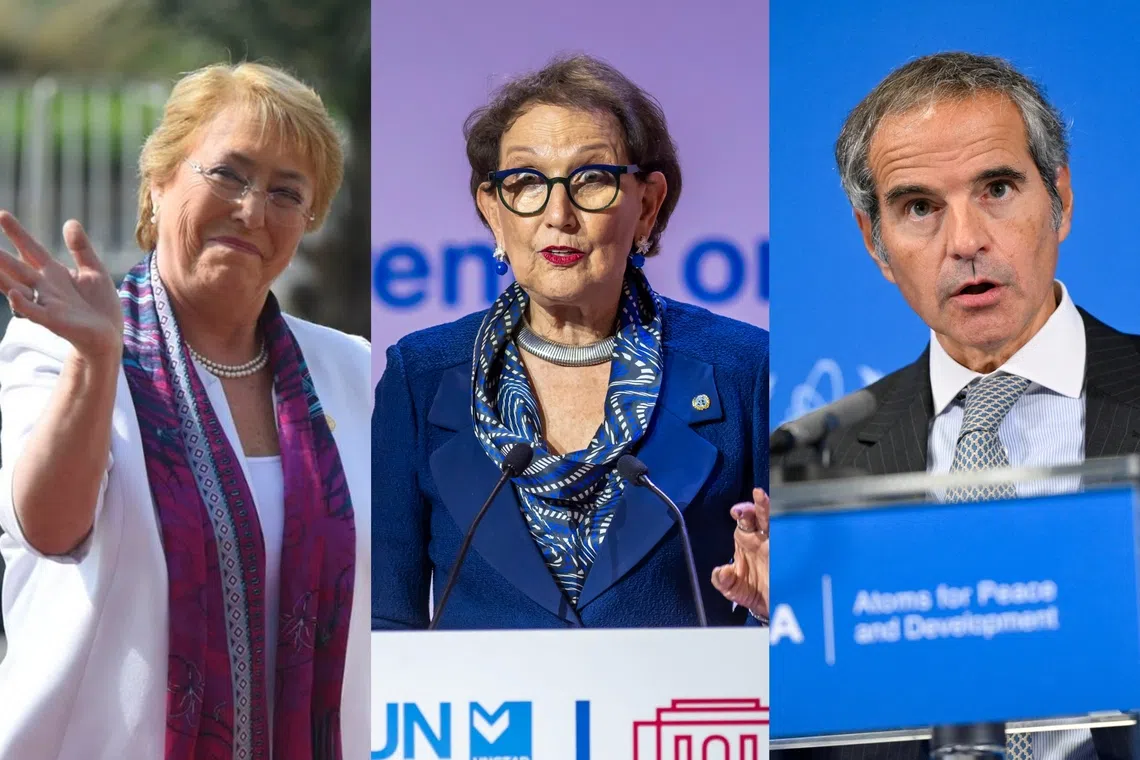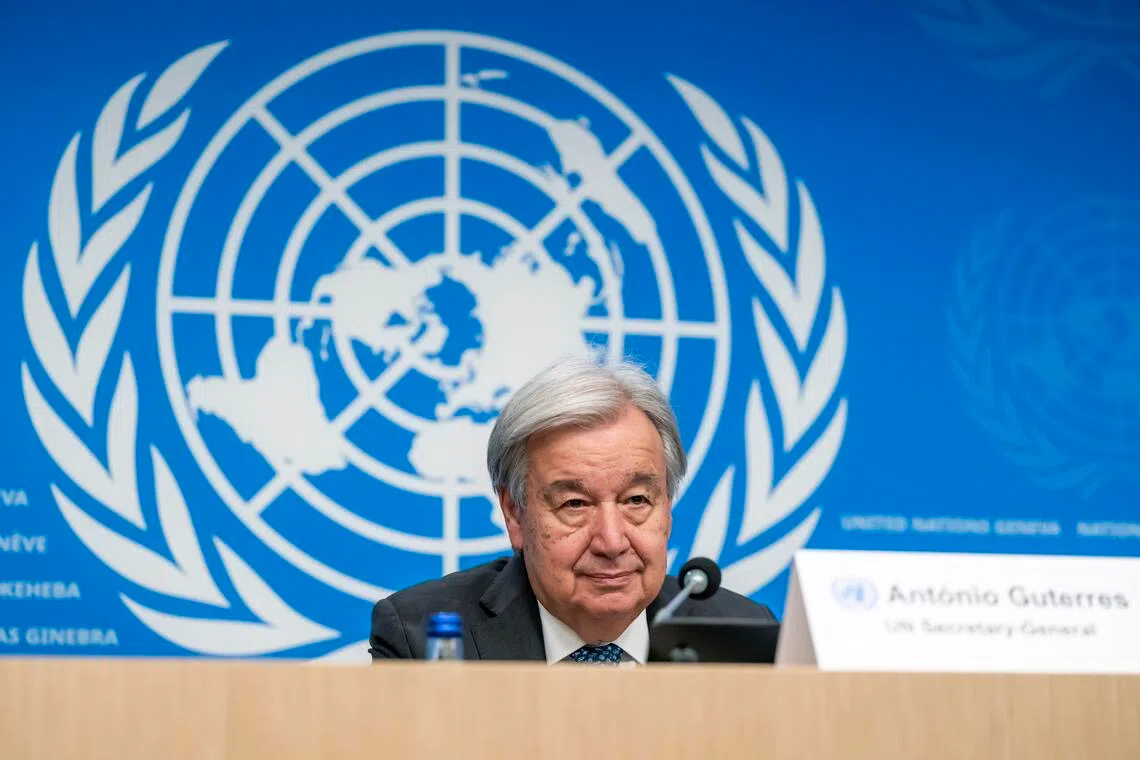Explainer: How will the next UN chief be chosen, and who wants the job?
Sign up now: Get ST's newsletters delivered to your inbox

Candidates so far for the role of the next UN chief are (from left) former Chilean president Michelle Bachelet, former Costa Rican vice-president Rebeca Grynspan, and current International Atomic Energy Agency director-general Rafael Grossi of Argentina.
PHOTOS: FACEBOOK/MICHELLE BACHELET, EPA, REUTERS
Follow topic:
- The UN will elect a new Secretary-General in 2026, with the formal process starting when a joint letter soliciting nominations is sent by the end of the year.
- Publicly declared candidates include Michelle Bachelet (Chile), Rebeca Grynspan (Costa Rica), and Rafael Grossi (Argentina), with Latin America considered next in the traditional regional rotation.
- The Security Council will hold secret ballots until a consensus is reached, followed by a General Assembly vote; efforts are underway to increase transparency in the selection.
AI generated
UNITED NATIONS, United States - A new United Nations Secretary-General will be elected in 2026 for a five-year term starting on Jan 1, 2027.
Here are the potential candidates so far and how the successor to current UN chief Antonio Guterres will be chosen:
When does the process start?
The race will formally start when the 15-member Security Council and the president of the 193-member General Assembly send a joint letter soliciting nominations.
That letter is due to be sent by the end of the year. A candidate has to be nominated by a UN member state.
The job traditionally rotates among regions, but when Mr Guterres - who is from Portugal - was elected in 2016, it was supposed to be Eastern Europe’s turn. Next on the list is Latin America. However, some diplomats expect candidates from other regions.
Who wants to be the next secretary-general?
While the race doesn’t formally begin until the letter is sent by the presidents of the Security Council and the General Assembly, there are already several publicly declared candidates:
Michelle Bachelet, Chile: Chile will nominate the country’s former president, Ms Michelle Bachelet, President Gabriel Boric said on Sept 23, 2025. Ms Bachelet was Chile’s first female head of state and served as president of the South American nation twice. Ms Bachelet was UN High Commissioner for Human Rights between 2018-2022 and executive director of UN Women between 2010-2013.
Rebeca Grynspan, Costa Rica: Costa Rica will nominate former vice-president Rebeca Grynspan, President Rodrigo Chaves said on Oct 8, 2025. Ms Grynspan, a 69-year-old politician and economist, currently serves as secretary-general of the UN Conference on Trade and Development (UNCTAD).
Rafael Grossi, Argentina: Mr Grossi has long said he was considering campaigning to be secretary-general. When asked by Reuters on Sept 3, 2025, if he was definitely going to run, he said: “Yes, I am going to do that. Yes.”
A veteran Argentinian diplomat, Mr Grossi is director-general of the International Atomic Energy Agency, a role he has held since 2019.
What is the process?
The 15-member Security Council will formally recommend a candidate to the 193-member General Assembly for election as the 10th UN secretary-general in 2026.
The Security Council will hold secret ballots – referred to as a straw poll - until a consensus is reached on a candidate. The choices council members are given for each candidate in the straw poll are: encourage, discourage or no opinion.
Ultimately, the five permanent veto-wielding council members - the United States, Russia, Britain, China and France - must agree on a candidate.
The ballots for the veto powers in the straw poll are traditionally a different colour to those of the 10 elected members. When Mr Guterres was chosen in 2016 to be recommended to the General Assembly, it took six straw polls for the Security Council to reach agreement.
The Security Council then adopts a resolution, traditionally behind closed doors, recommending an appointment to the General Assembly. The resolution needs nine votes in favour and no vetoes to pass.
The General Assembly’s approval of the appointment of a secretary-general has long been seen as a rubber stamp.

A successor to UN Secretary-General Antonio Guterres will be elected in 2026 for a five-year term starting Jan 1, 2027.
PHOTO: EPA
How transparent is the process?
The United Nations has been working to improve the transparency of the historically opaque selection process.
The General Assembly, in a resolution adopted in September 2025, said each candidate should provide a vision statement when they are formally nominated and be given the opportunity to present it. It said the vision statement should also be publicised on a dedicated United Nations web page.
The Assembly said each candidate should disclose their sources of funding and that any candidates who already hold a UN position “should consider suspending their work in the United Nations system during the campaign, with a view to avoiding any conflict of interest that may arise from their functions and adjacent advantages.”
What does the secretary-general do?
The UN Charter calls the secretary-general the “chief administrative officer” of the world body. The UN website describes the role as “equal parts diplomat and advocate, civil servant and chief executive officer.”
Mr Guterres currently oversees more than 30,000 civilian staff and 11 peacekeeping operations with around 60,000 troops and police. The core annual United Nations budget is US$3.7 billion (S$4.8 billion), while the peacekeeping budget is US$5.6 billion.
Since the power to authorise military force or sanctions rests with the Security Council, the UN chief has little more than a bully pulpit. Many diplomats say the five council veto powers prefer a “secretary” rather than a “general”.
Has a woman ever been secretary-general?
No. There is a growing push for the United Nations to choose the first female secretary-general in its 80-year history.
In the resolution adopted in September, the General Assembly noted “with regret that no woman has ever held the position of Secretary-General” and encouraged countries to “strongly consider nominating women as candidates.” REUTERS

